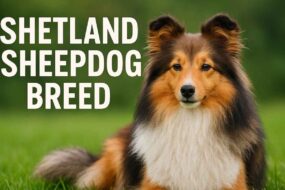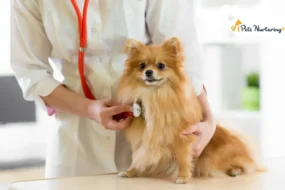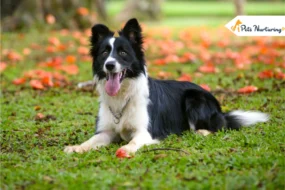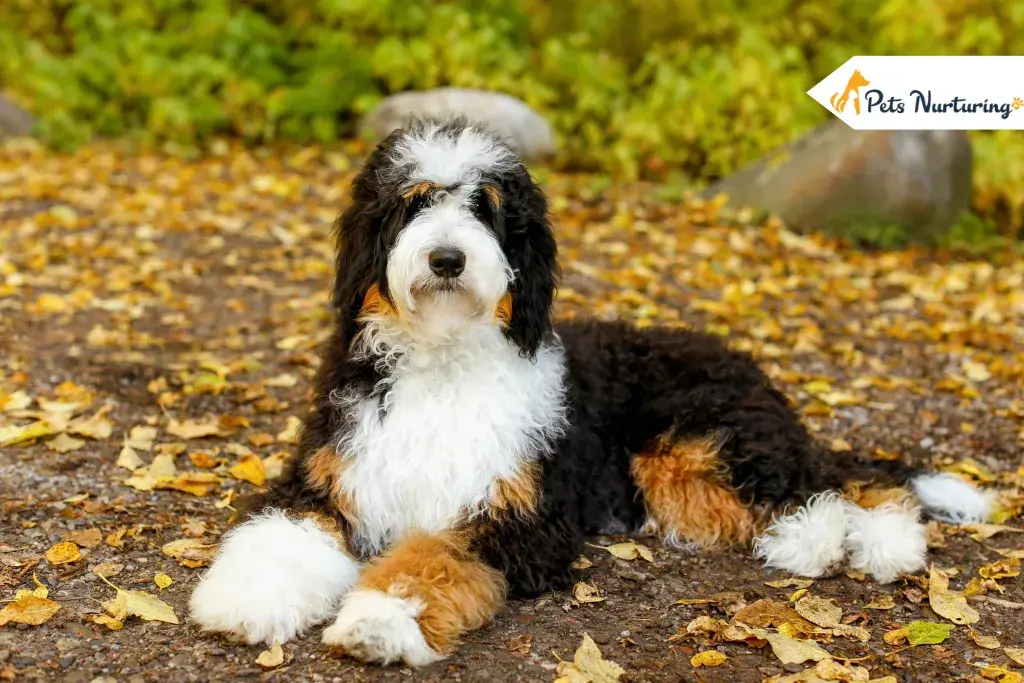
Have you seen a dog that is as cute as a doodle? At the same time, it looks a bit different than regular doodle dogs? Well, chances are you have seen a designer breed: the Bernedoodle! Yes, full grown bernedoodle is a mixed dog breed resulting from crossbreeding a pure Bernese mountain dog and a poodle.These cute and adorable full grown mini bernedoodle are so popular that they’re considered one of the finest designer dog breeds in the world.
Available in three sizes, Bernedoodles are for everyone. They’re good with kids, infants, elders, and other pets. They come in three sizes: Tiny Bernedoodle, Miniature Bernedoodle, and full grown standard bernedoodle. Their sizes are:
- Tiny Bernedoodle: 12-17 in tall
- Miniature Bernedoodle: 18-22 in tall
- Standard Bernedoodle: 23-29 in tall
So if you want to purchase a full grown bernedoodle or a puppy or just want to know more about the bernedoodle breed, this guide will help you.
This ultimate full grown bernedoodle dog breed guide will help you get all the information you need. We’ve covered everything from their origin and history to the temperament and grooming of a full grown bernedoodle. We’ve also included a bernedoodle puppy growth chart and their diet plan. So don’t skip anything and keep reading till the end and get all the information about this beautiful designer dog breed.
Let’s start.
Bernedoodle Dog Breed OverView
Breed Name : Bernedoodle
Breed Group: Hybrid
Height: 23 – 29 Inches
Weight: 70 – 90 Pounds
Lifespan: 12 – 18 Years
Coat: wavy to curly coats
Color: Broun / Chocolate / Liver , Black , White
Temperament: Gentle , Friendly , Outgoing and Playful
Needs for Grooming: High
Hypoallergenic: Yes
Origin: United Kingdom
History of Bernedoodle
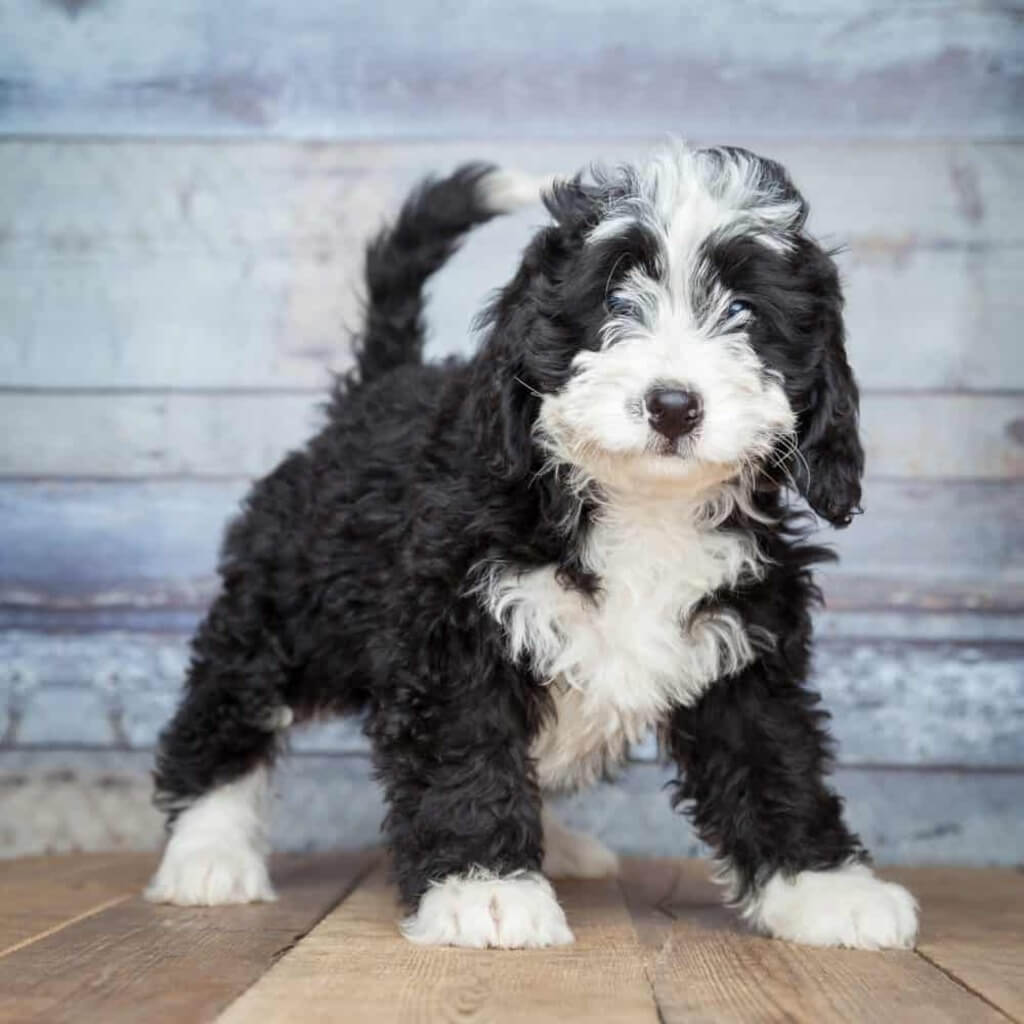
- After the successful breeding of the Goldendoodle and Labradoodle, breeders wanted to create a dog breed that would be a perfect companion for families of all shapes and sizes.
- Bernedoodle is more popular in the US and Canada, but it is actually an unusual crossbreed in the UK.
- The first Bernedoodle was first created in the early 2000s by Sherry Rupke, a Canadian dog breeder, and owner of Swissridge Kennels. The main reason why she chooses to breed these two breeds is to combine the Poodle’s clever and goofy personality with the unfaltering loyalty of the Bernese Mountain Dog.
- “I first decided to breed the two because of the health benefits of mixed-breed dogs,” says Rupke. “The second reason was they are great for most people with allergies (when bred right). If you do have allergies, it is important to talk to your breeder so they can find the proper coat type for your allergies.”
- Bernadoodle is a new breed, but its origins the Bernese Mountain Dog has a long history back to 2,000 years.
- As this is a hybrid breed, it is not recognized by any of the reputable purebred dog registries, such as the American Kennel Club or United Kennel Club.
- Apart from this, this breed doesn’t have any official breed standards; that’s why you can see many variations in this breed. Each and every Bernedoodle looks and acts differently.
Types of Bernedoodles

There are three different generations of Benerdoodles:
The F1 Bernedoodle
This is a first-generation 50-50 cross where a purebred Bernese Mountain Dog and a purebred Poodle are crossed between. This is also considered the healthiest as the puppies of F1 have fewer chances of having any inheritable diseases.
The F1b Bernedoodle
F1b Bernedoodles was created by crossing F1 Bernedoodles with Poodles. This one has 25 percent Bernese and 75 percent Poodle characteristics. These Bernedoodles are low-shedding; that’s why they are perfect for families with allergies.
The F2 Bernedoodle
This is a result of breeding two Bernedoodles.
Here is a complete table of Bernedoodle Generation (data taken from welovedoodles):
- F1 Bernedoodle: 50% Poodle & 50% Bernese Mountain Dog
- F1B Bernedoodle: 75% Poodle & 25% Bernese Mountain Dog
- F1BB Bernedoodle: 87.5% Poodle & 12.5% Bernese Mountain Dog
- F2 Bernedoodle: 50% Poodle & 50% Bernese Mountain Dog
- F2B Bernedoodle: 62.5% Poodle & 37.5% Bernese Mountain Dog
- F2BB Bernedoodle: 81.25% Poodle & 18.75% Bernese Mountain Dog
- F3 Bernedoodle or Multi-generation Bernedoodle: Numerous generations of Bernedoodle reproduce normally backcross breeding to the Criterion Poodle.
Appearance of Bernedoodle
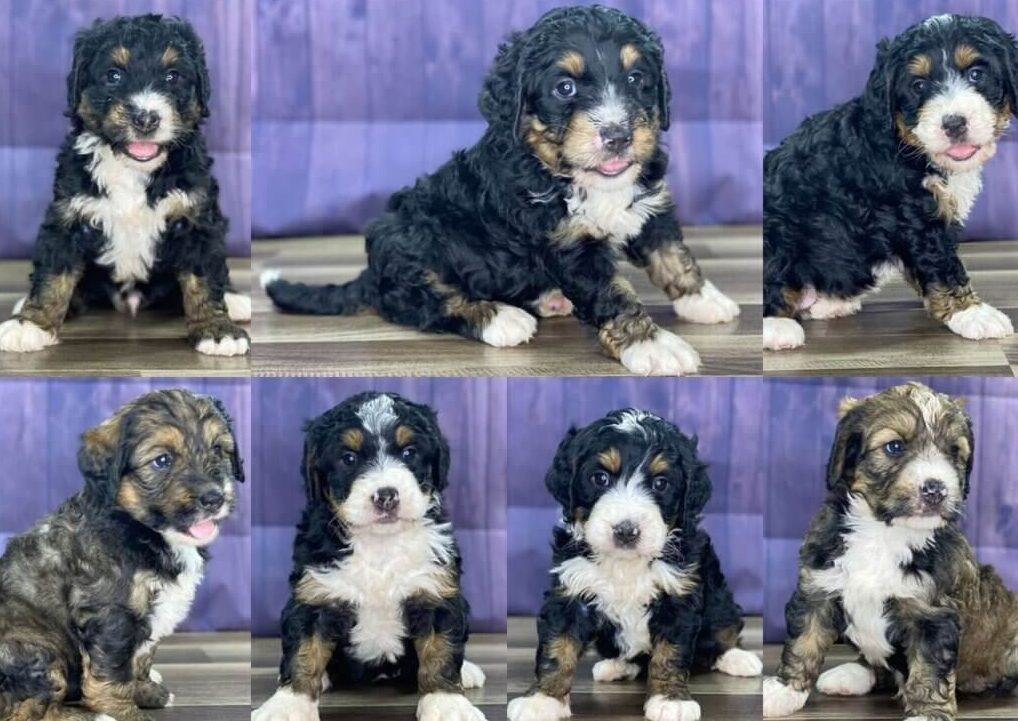
Bernedoodle is a happy dog with a luscious coat and a teddy bear-like appearance. How? I know the Bernese mountain dogs are generally black, tan, and white, but the poodles have a much wider range of coat colors. That’s why Bernedoodle is not only available in various sizes but also in various fur colors. These canines can be pure black, black and white, or a random mix.
Because of their thick wavy coat, these dogs are also well suited to colder parts of the world.
Fur & Coat
These Bernedoodles cute dogs are available in different coat types: straight, wavy, and curly. Among all, the wavy type is most popular in people with mild allergies. So, basically, the straighter the dog’s coat, the more he will shed. That’s why people prefer Bernedoodle with a wavy coat so that there will be less fur around their home.
However, the upside of the straight coat is that they’re easy to maintain as compared to the wavy and curly furs. These ones need more stringent grooming needs.
Bernedoodle is considered hypoallergenic because of its curly coat, but it can be a good option for those who tend to sneeze, sniffle, or itch around dogs.
Here are some Bernedoodle coat colors options available:
- White
- Brown
- Black
- Black and white
- Black and brown
- White and brown
- Black sable
- Tri-colored with patches of black, white, and brown
- Blue
- Grey
- Fawn
- Apricot
- Cream
- Merle
Height & Weight of Full Grown Bernedoodle
Now, let’s talk about the height and weight of a Bernedoodle.
If you’re planning to add a Bernese Mountain Dog Poodle mix to your family, first, you should know about the bernedoodle size. Many of you might be wondering, “how big do Bernedoodles get?”
As we already told you that Bernedoodle is available in three sizes: Tiny Bernedoodle, Mini Bernedoodle, and Standard Bernedoodle.
Here’s a table of their respective height and weight:
| Tiny/Toy Bernedoodle | Mini/Medium Bernedoodle | Standard Bernedoodle | |
| Weight | 10-25 pounds | 25-55 pounds | 55–90 pounds |
| Height | 15 inches or less | 15-22 inches | 23-27 inches |
| Age at Full-Grown | 9-11 months | 11-13 months | 12.5-16 Months |
Do you have a Bernedoodle puppy, and you’re worried about his growth? Don’t worry; check out this table about full grown bernedoodle puppies.
Here’s the complete puppy growth chart of all types of Bernedoodle dogs, which will help you to track your puppy’s growth in the right way:
| Age | Tiny/Toy Bernedoodle | Mini/Medium Bernedoodle | Standard Bernedoodle |
| 1 Month | 6 LBS | 11 LBS | 14 LBS |
| 2 Months | 10 LBS | 18 LBS | 24 LBS |
| 3 Months | 14 LBS | 25 LBS | 33 LBS |
| 4 Months | 18 LBS | 33 LBS | 42 LBS |
| 5 Months | 20 LBS | 36 LBS | 46 LBS |
| 6 Months | 22 LBS | 40 LBS | 52 LBS |
| 7 Months | 24 LBS | 43 LBS | 55 LBS |
| 8 Months | 26 LBS | 46 LBS | 59 LBS |
| 9 Months | 27 LBS | 48 LBS | 62 LBS |
| 10 Months | 28 LBS | 50 LBS | 64 LBS |
| 11 Months | 29 LBS | 51 LBS | 65 LBS |
| 12 Months | 29 LBS | 52 LBS | 66 LBS |
| 18 Months | 30 LBS | 53 LBS | 67 LBS |
However, some important factors could affect the growth of your Bernedoodle, such as:
- Nutrition
- Exercise
- Size expectancy
- Gender
- Parent size and breeds
- Breed standard growth
- Size of the litter
Temperament of Bernedoodle Dog
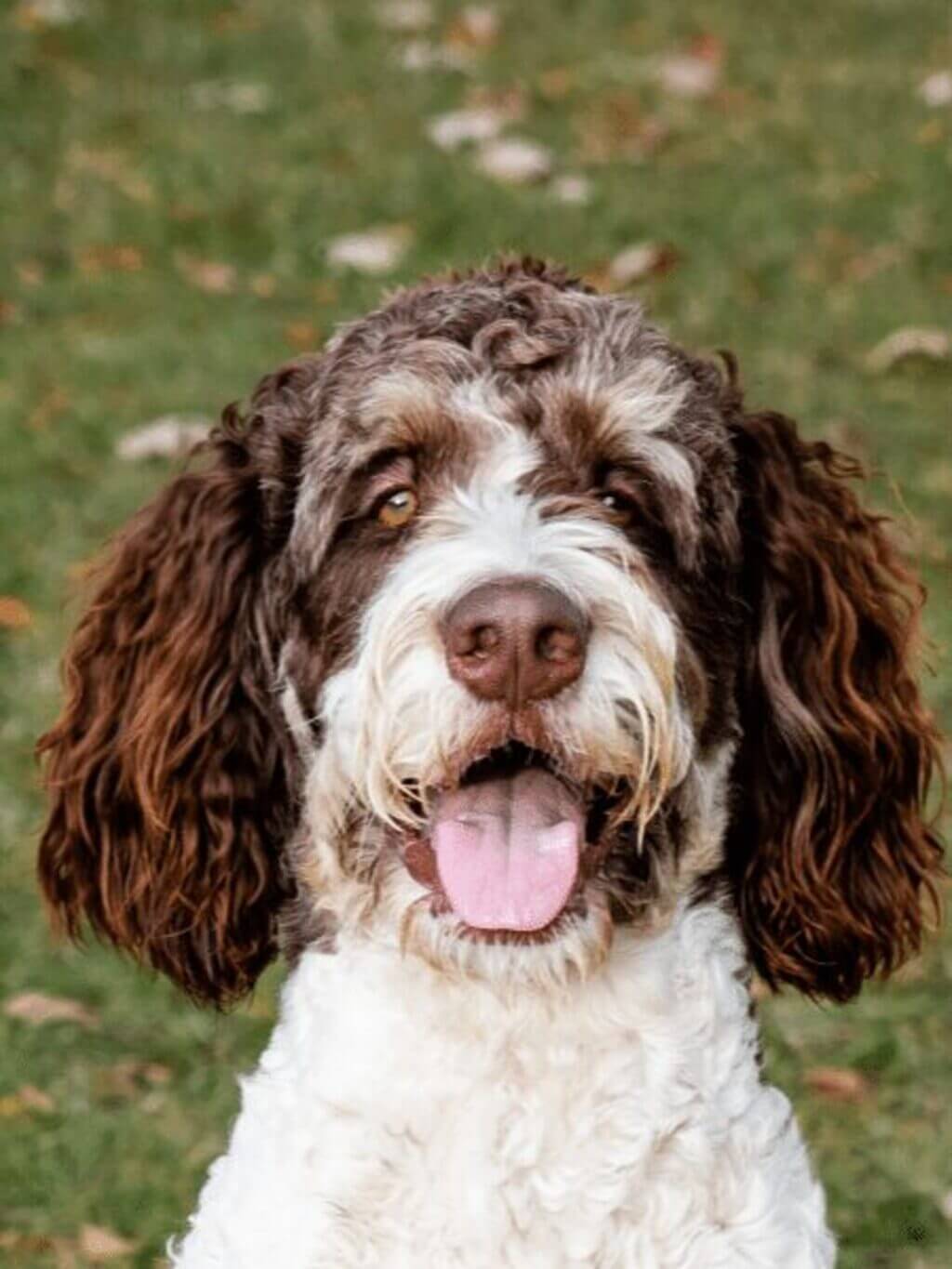
Affectionate and playful!
Yes, these two words perfectly describe the personality of the bernedoodle. These canines are extremely good with younger kids and elders. They will be wonderful lifelong companions to your children. They’re also pretty intelligent and crave attention from their humans!
However, these dogs are a bit apprehensive, sensitive, and skittish around strangers at first, but soon they know they got to know them, and they instantly become friendly and comfortable around them. That’s why it’s super important to socialize your Bernedoodle puppy.
Here are some more personality traits of a bernedoodle dog:
Characteristics of the Bernedoodle
| Affection Level | High |
| Friendliness | Medium |
| Kid-Friendly | Medium |
| Pet-Friendly | Medium |
| Exercise Needs | Medium |
| Playfulness | Medium |
| Energy Level | Medium |
| Trainability | Medium |
| Intelligence | High |
| Tendency to Bark | Medium |
| Amount of Shedding | Medium |
Exercise and Diet of Bernedoodle Dog
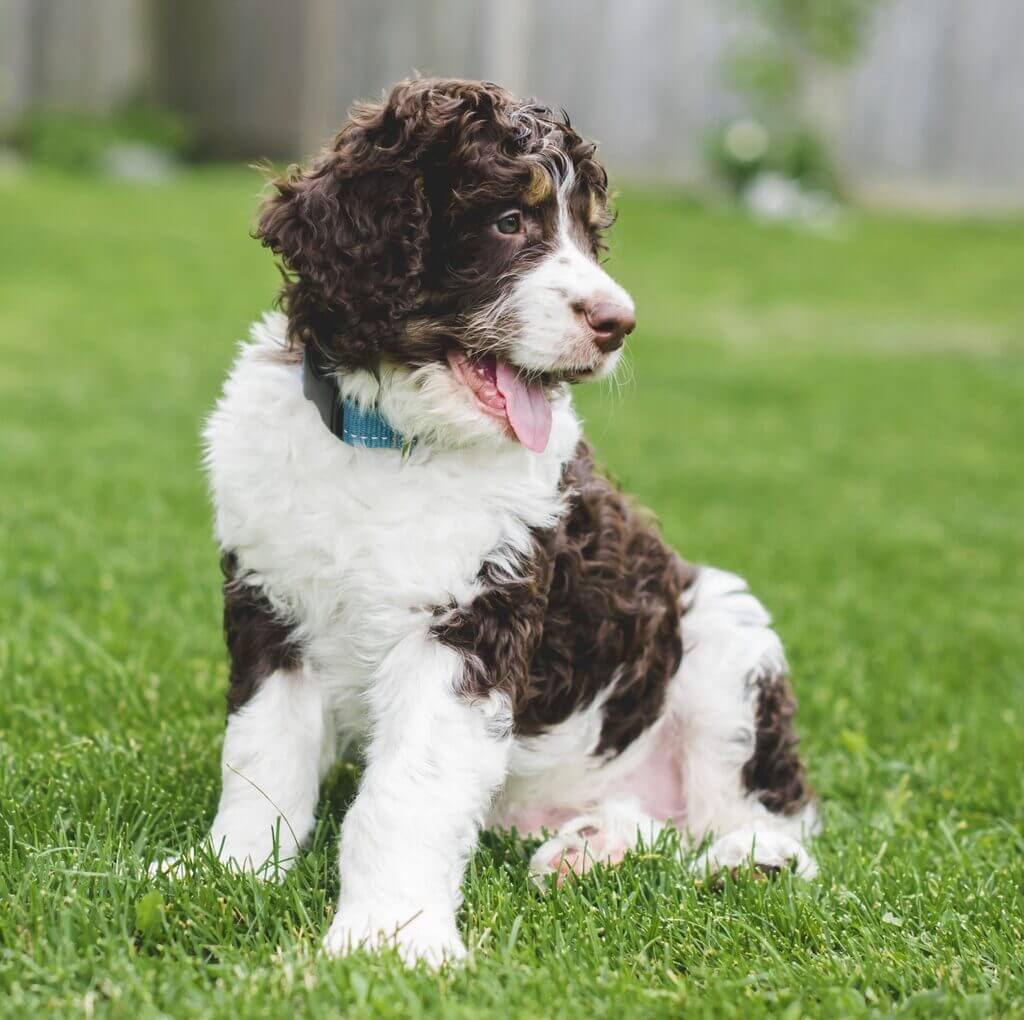
Bernedoodles are active and enthusiastic dogs with a playful, energetic nature! That’s why even a long walk makes them tired and happy. They enjoy everything from hiking and outdoor play activities to cuddling and sleeping.
If you want your dog to be happy and healthy, invest time into:
- leash walking training
- training their puppy to not jump on people
- training their puppy to not chew furniture
- working on their puppy’s mouthiness
- calm behavior around dogs and other pets like cats.
Now, what should you feed a full grown bernedoodle?
It’s important to provide a well-controlled, balanced diet to a mini bernedoodle full grown size. Try to always give your pet the best quality food that you can afford. Also, it’s important to stick with a regular routine with feeding.
So there are basically four main types of food:
- Wet
- Kibble
- Cooked
- Raw
Here are some things that you can give to bernedoodles full grown size dogs:
- A good-quality high-protein dog food
- Food items with omega 3 and 6.
- Combination of brown/white rice, beef, dried yeast, oatmeal, barley, poultry, egg, and fishmeal
- Canned dog food
- You can also give cooked and raw food such as liver, eggs, cottage cheese, sweet potatoes, chicken, and beef cuts.
- Foods that contain peas, fruit, potatoes (including sweet potatoes), carrots, and lentils are a good choice.
What NOT to Give:
- Avoid dog foods with fillers such as corn, wheat, and soy.
- Don’t give your dog food with any type of artificial colors or preservatives.
- Avoid canned dog foods with ingredients like soy, wheat, or meat by-products.
Grooming & Nail Care of Bernedoodle
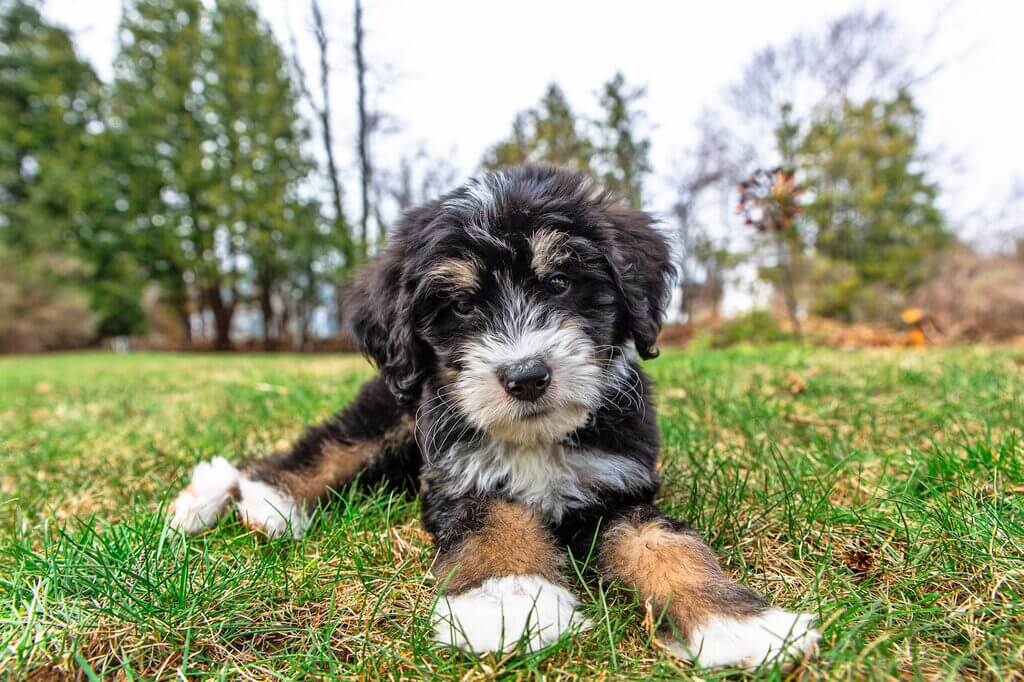
One of the best things about this dog breed is that they shed very less and are also more hypoallergenic than other dog breeds. You have to brush them two to three times a week to prevent tangles and matting of the coat. Also, don’t forget to visit the dog groomer for a haircut in a very few months.
As their coat is this thick and wavy, bathe your Bernedoodle only every three to four months, not more than this! And lastly, trim their nails every three to four weeks and also keep their eyes and ears clean.
Common Health Problems of Bernedoodle Dog
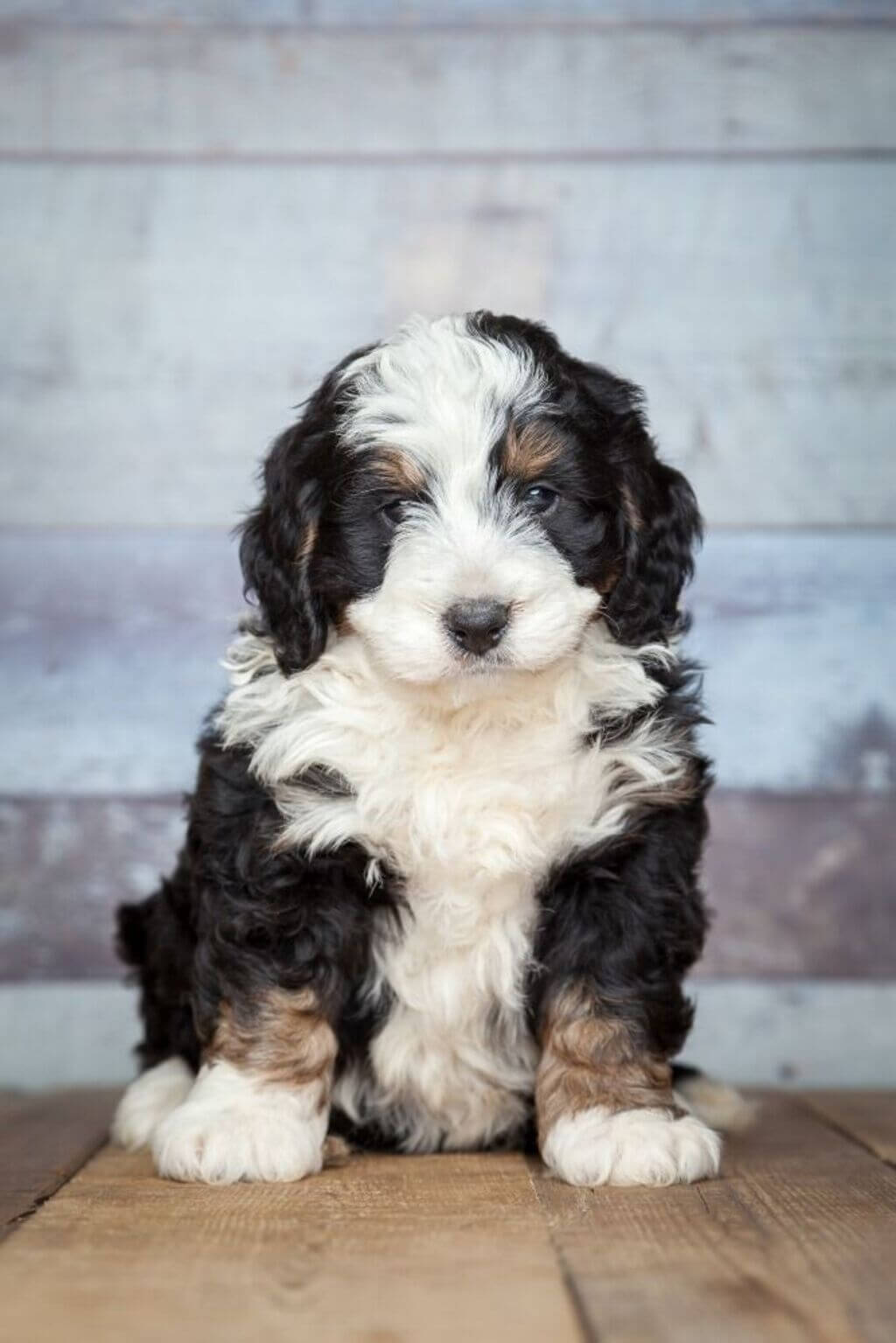
Are long Bernedoodle healthy dogs? What are the potential health issues ofBernedoodle Dog?
Like every other dog breed, the Bernedoodle is also prone to specific health issues or conditions.
Here’s a list of the most common health issues in Bernedoodle:
- Skin issues include excessive scratching, licking, and ‘hot spots’ (moist dermatitis).
- Bloat (GDV)
- Bones problems, such as DJD (degenerative joint disease) and osteoarthritis.
- Hip dysplasia and Arthritis.
- Elbow dysplasia.
These cute dogs may face only a few health problems, but you can avoid this by doing regular health checks. The average lifespan of a bernedoodle is about 12 to 18 years, so give them lots of love and care and enjoy this time!
Fun Facts About Bernedoodle Dogs
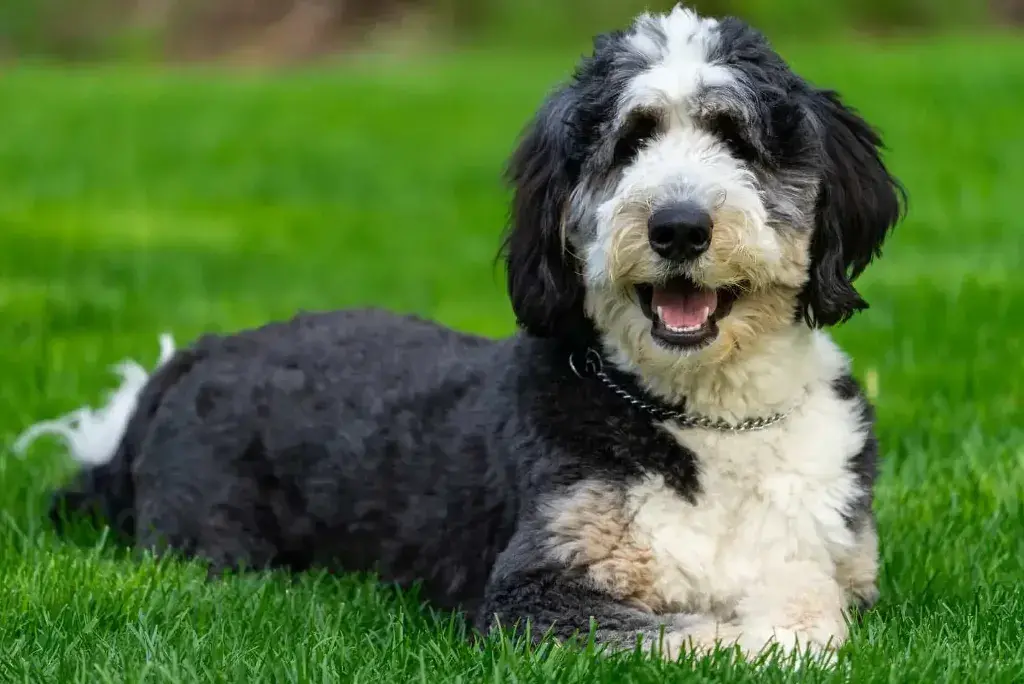
- A mini Bernedoodle named Timber is an Instagram famous dog, and he has over 26,000 followers!
- Famous actress and filmmaker Greta Gerwig always carries her mini Bernedoodle, Wizard, everywhere!
- Bernedoodle puppies have a pink nose that later turns black once the dog is fully matured.
- The average price range of a Bernedoodle is between $1500 and $5000.
Are Bernedoodle Dogs Good Pets?
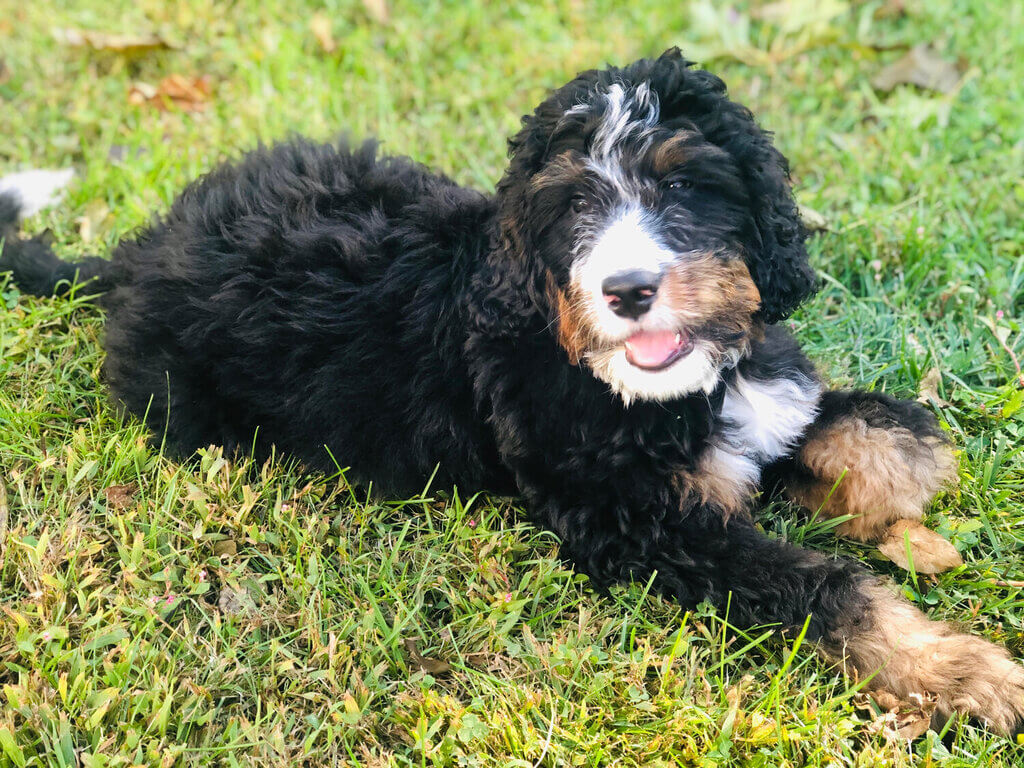
The answer to this question is YES!
Whether you’re buying a full grown bernedoodle dog or a puppy, always make sure to get it from a reputable breeder. This breed comes in different sizes; choose the one according to your family’s needs.
So this is all about a full grown mini bernedoodle. I hope this in-depth Bernedoodle Breed Guide and care information will help you understand these cute, friendly, and energetic dogs. Please share this blog with your friends and family if you find this blog helpful.
Keep reading:








